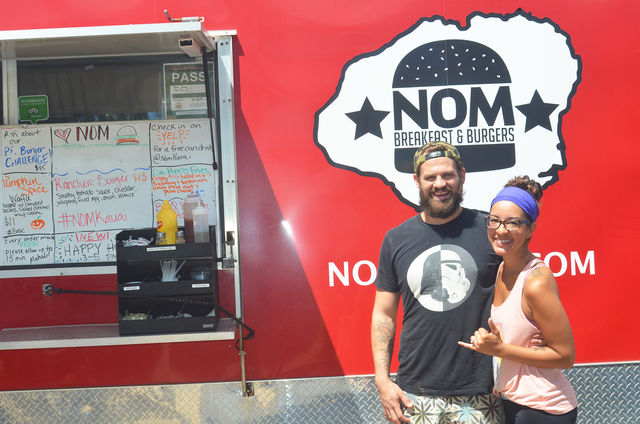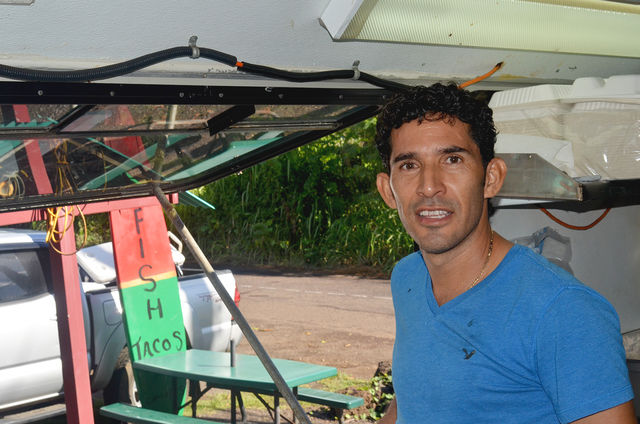Food truck owners agree that the mobile establishments are an easy first step into the restaurant business.
“They’re a lot easier to start up; there’s lower overhead and less risk involved than opening up a brick-and-mortar place,” said Tom Fuquay, who owns Nom Kauai, a food truck in Kapaa.
Miguel Baldera, who owns Chalupa’s Mexican Food, located in Koloa, agreed.
“You don’t need that much money to open up a food truck — $10,000 and you can do it,” he said.
Baldera bought his truck, which is a converted party bus from Oahu, for about $6,000. He spent another $7,000 to gut it, buy equipment and outfit it as a kitchen.
There are 67 food trucks on Kauai, up 16 from 2015, said Gerald Takamura, chief of the district environmental health program.
When Baldera opened his in 2011, there were a handful of other food trucks. A year later, that number increased to 39.
Fuquay and his wife, Alicia, bought their food truck from a company in Missouri for $29,000. It was formerly a food truck, so they didn’t have to spend extra money to make it a kitchen.
But the process of opening it here was long because of the “red tape” they had to go through to get the truck up to Hawaii’s health code.
“It was in code in Missouri, but we had to bring it up to Hawaii’s’s standards,” he said.
In Hawaii, food trucks are regulated by the Department of Health.
They are classified as a food establishment and are regulated by the same guidelines that are used for brick-and-mortar restaurants, said Peter Oshiro, environmental health program manager for the sanitation/food and drug department of DOH.
Proprietors must follow the procedures and requirements for opening a mobile food establishment, including a hand washing station is located within the establishment; hot holding units shall hold hot foods at 135°F or higher; and the Food Establishment Permit must be posted on the establishment and shall be easily visible to the public.
The DOH does not regulate where the food trucks can vend. It is up to the individual counties to enforce parking violations, or restrictions on where a mobile unit can park and vend, Oshiro said.
County oversees permits
On Kauai, someone interested in opening a food truck near county parks and recreational facilities needs to fill out a commercial activities designation application.
They need to provide their “name, business name, contact information, type of activity they are interested in (in this case food truck service), and the park, area or facility they would like to operate at/near,” said Lenny Rapozo, director of the Department of Parks and Recreation.
They also must answer 15 questions about their business and the potential impacts on the requested location, hours of operation, maintenance matters and insurance. A copy of the menu must also be provided, Rapozo said.
In addition to the application, a potential vendor needs to provide certificates from DOH that show the establishment meets health and food preparation standards. Under the permit, only food items can be sold. Merchandise like hats and T-shirts are not allowed, Rapozo said.
Vendors pay $100 per month to operate for seven days a week.
Food trucks are not allowed to drive to and sell their food on beaches or other public spaces. With permission, they can be on private property.
According to the county, food trucks may park along county streets if they follow state and county traffic and parking laws as the county has the authority to prohibit any hazards in its right of way and enforce state or county traffic laws.
The Kauai County Council is considering Bill No. 2628, which aims to create a comprehensive permitting process for these types of businesses.
Some have pointed out that a vendor would be able to set up shop in a parking lot next to an already established business. The street vendor’s business could have a negative impact on the brick-and-mortar establishments.
The bill is scheduled to be heard by the Council’s Public Works/Parks and Recreation Committee on Wednesday.
Another requirement is that all food preparation has to be done at a separate commissary kitchen.
“We can only serve food at the trucks,” Baldera said.
Before a final inspection, owners must submit a food establishment application to the sanitation branch. The final cost of the permit is based on the food operations involved.
The DOH does not regulate whether the food trucks are mobile, Oshiro said.
“Public health protection is assured by proper servicing of the mobile unit to ensure physical facilities are in order,” he said.
Just like stationary establishments, food trucks are subject to random health inspections.
“The permitting process is easy if you know restaurant health codes and where the equipment needs to be,” Baldera said.
Southern breakfast, burgers
The Fuquays opened Nom Kauai about a year ago with the help of friends who served as investors. The couple, who is originally from Florida, said they opened the food truck with the intent to bring a hint of southern flair to Kauai.
Nom Kauai specializes in burgers and breakfast, with southern charm.
For breakfast, the food truck serves up southern comfort food like biscuits and gravy and chicken and waffles.
The Woody Burger, made with onion straws, cheddar cheese, jalapenos and barbecue sauce, is popular for lunch.
Prices at most food trucks are similar to what you would find in a sit-down restaurant. Waffles run $11, while a Ranchero Burger is $13 at Nom Kauai.
“I’ve been a chef for eight years, and I’ve worked at a lot of restaurants on Kauai,” Fuquay said. “I had this vision of burgers and breakfast for a food truck. I started with zero money, and it’s grown.”
For the couple, the timing was perfect because a lot became available at the food truck park in Kapaa, by the neighborhood center.
“We struck while the iron was hot,” Fuquay said.
Mexican food, Hawaiian flair
Chalupa’s Mexican Food has been a staple in Poipu for the last four years. Baldera took over the Weliweli Road location after another food truck closed and he quit his job at the Hyatt.
“I was a sous-chef there, but when I quit my job, I didn’t know what to do,” he said. “A friend approached me about a food truck opportunity and I took it.”
Although originally from Vera Cruz, Mexico, Baldera said he wasn’t well versed in Mexican cuisine.
“I called my mom to get recipes; she gave me all the insights,” he said.
Baldera, who has 18 years experience in cooking, tweaks traditional Mexican recipes to give them a Hawaiian flair.
“I wanted to accommodate the people here so they would like it,” he said.
Food trucks have one other benefit, Alicia Fuquay said.
“People have high expectations when they go to restaurants. With a food truck, they may not expect a whole lot, and you end up surprising them with an awesome plate of food,” she said.






